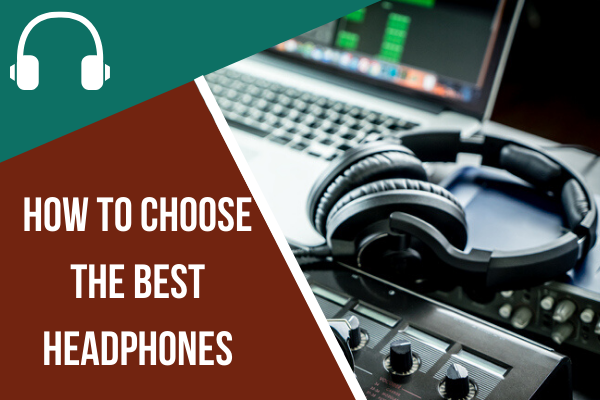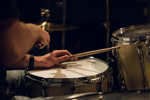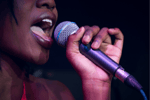How to Choose the Correct Studio Headphones
Picking the right headphones to use in your studio can be a daunting task. Do you start off buying the cheap, affordable headphones or do you buy the better quality, yet more expensive ones?
There are so many brands, styles, and options that choosing the best studio headphones for your music production project can be exhausting. Thankfully, we are here to help!
Let's discuss what you should be looking at.
Table of Contents:
Headphone Styles
There are two main types of headphones, Open-back and Closed-back. Let’s go over some of the more prevalent differences between the two styles.
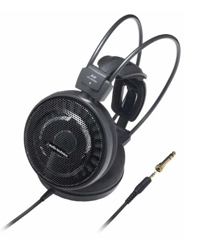 1. Open-Back
1. Open-Back
An open style backing will give you a more natural sound.
The point of the open-back is to let some outside noise in. While this style of headphones is great, it’s not the best option for recording.
With the open-back style, the headphones will bleed more than closed-back headphones. Therefore, if you're recording, the mic will pick up the audio from what you are hearing in the headphones. That is definitely something you do not want to happen.
However, open-back headphones are great for checking the balance of your mix!
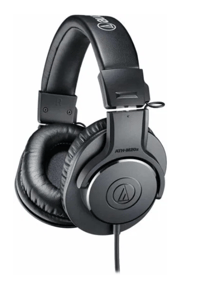 2. Closed-Back
2. Closed-Back
Design-wise, this is pretty much opposite of the open back style. These headphones will allow for much more concentration and keep outside noise to a minimum.
Closed-back headphones are used by a lot of engineers, producers, DJ’s, and artists.
You will also tend to hear the low end better since the sound isn’t able to escape as easily, compared to the open-back headphones.
Headphone Qualities to Consider
Overall Comfort and Fit
Comfort is essential. If you're only wearing headphones briefly for, say, 10-15 minutes, any set of headphones will feel fine. But, when you get into the nitty-gritty of music production and mixing, that comfort can quickly fade.
If you have the opportunity to test headphones out before purchasing, we recommend wearing the headphones for at least 20 minutes before making a concrete decision regarding comfort.
For closed-back circumaural headphones, the larger the ear cups, the better off you'll be. If your headphones rest directly on your ear, aim for smaller headphones with fabric padding to soften the pressure.
Another factor to consider in terms of comfort is the headphone's weight. More often than not, lighter headphones tend to be more comfortable. Makes sense, right?
If you know you have a long, tedious project coming up, having light headphones with foam pads are your best bet.
Take the headband into consideration, as well. While many headphones offer the over-the-head style headband, there are many styles that place the headband behind your neck. Generally, this comes down to preference and personal comfort.
However, some behind-the-neck headphones stick out, which can cause issues if you recline back against the chair's headrest. Another feature that helps enhance comfort is the rotating cup, especially on over-the-ear headphones.
Headphone Durability
You want your headphones to last. You can have the nicest and most comfortable headphones money can buy, but if they fall apart, does it even matter?
However, durability often translates to heavier headphone weight. Light headphones can easily be sat on or snapped in half more easily.
You just have to be careful with them and put them in a protective case when they’re not on your head. If they are fold-ups, check out the hinges for sturdiness.
Are the cables substantial or thin and delicate? If you are buying higher-priced headphones, find out if replacement parts are available. It’s a lot cheaper to replace a cable or the ear pads than to replace an entire set.
Headphone Plugs
These aren't just simple headphones to plug into your iPod and be on your way. In fact, even the iPhones have recently changed their audio jacks in the last few years. The lesson to be learned here: pay attention to plugs.
Look at your gear and technology and see what type of plug you'll need. The most common connection for music listening is a 1/8" mini plug, but if you plan on using an interface, you'll likely need a 1/4" plug.
They make adapters that are relatively inexpensive, but take the time to check out your equipment before you start purchasing. It is always advised to be prepared and make educated purchases.
Price Ranges
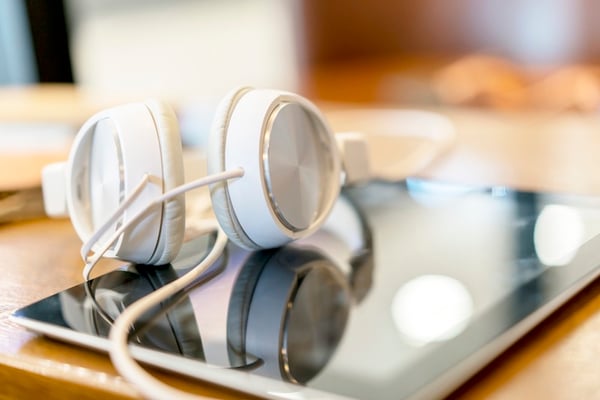
As previously mentioned, headphones can come at a wide range of prices.
For the most part, you will get what you pay for. Of course, always do your research and check out high-authority reviews, but headphones really do tend to be much better quality the higher in price they go.
This doesn’t mean you won't find good headphones that are on the cheaper side. If you're on a very tight budget, take a look at Tascam's TH-02 Closed Back Studio Headphones for about $17.
if you have a little more wiggle room in your budget, you should check out Audio-Technica's ATH-M50x Professional Studio Monitor Headphones for $149.
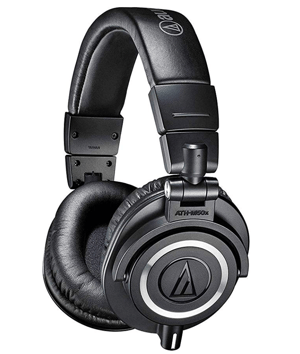
What's the Point of Headphones?
There are many tasks that headphones are used for in the studio.
If you are checking your mix, then you will need headphones with a flat response. If you record, you will mainly need a closed-back pair. Each type of headphone will do specific things, so you may need more than one pair.
When choosing a pair of headphones, know what you will be using them for. Will they be used for recording or will they be used to check a mix?
This will help you dial in exactly what you need to find so you aren’t wasting any time browsing through the endless models that are available.
Musicians use headphones all the time to listen to the track in their ears while they are playing their instruments during a recording. Imagine if you were in a room where there was a monitor playing the track and then a microphone attempting to record a guitar track.
That just wouldn’t work, right? The audio from the speaker will be picked up from the mic and the track wouldn’t work.
This being said, headphones are a studio essential.
Now that you have an idea of how to choose the right headphones for you, time to get searching! Picking the correct headphones can be daunting, but we hope this gave you a better idea of where to start.
Find what’s right for you and your recordings will be much better!
Interested in Professional Music Production?
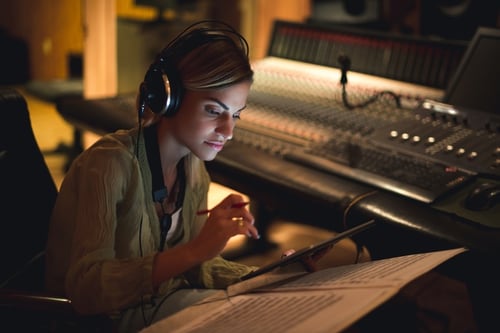
One of the best ways to master your music production skills is by attending an accredited music college. The Atlanta Institute of Music and Media offers the following programs for producers and engineers:
Learn from industry-leading instructors and follow in the footsteps of notable alumni like Turbo the Great and Kesha Lee, who earned a Grammy for This is America with Childish Gambino.
Click the link below to discover how AIMM can benefit your music production career today.
